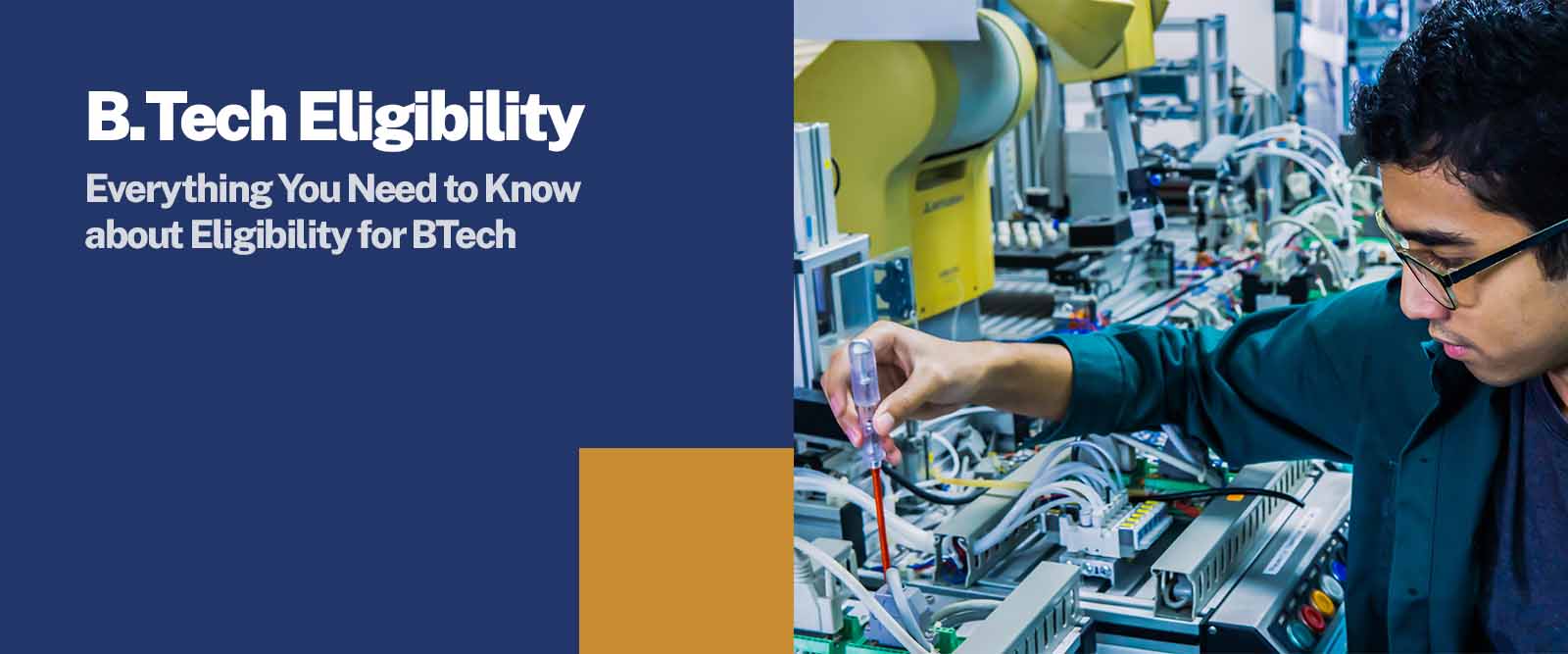5800 students unlocked their dream jobs with UG/PG programs in top colleges. Apply Now!
In India, BTech eligibility is governed by AICTE, UGC, NTA (JEE Main), IITs (JEE Advanced), JoSAA, and state technical education authorities. Most students must pass Class 12 with Physics and Mathematics, meet minimum marks (usually 45%–50%), and qualify through JEE Main, state CETs, or university entrance tests. Central institutes like IITs, NITs, IIITs, and GFTIs apply stricter academic criteria.
Who is eligible for BTech in India?
Students who have passed Class 12 (10+2) from a recognized board with Physics and Mathematics and an approved third subject are eligible for most BTech programs, as per AICTE, UGC, and exam authorities.
Scannable points:
-
Passed Class 12 from CBSE, ISC, State Boards, NIOS, or equivalent (AIU for foreign boards)
-
Physics + Mathematics are mandatory
-
Third subject: Chemistry / Biology / Biotechnology / Technical Vocational
-
Must meet minimum percentage set by exams/colleges
What subjects are required in Class 12 for BTech?
As per AICTE and JEE Main (NTA), Physics and Mathematics are compulsory, along with one approved third subject.
Subject requirements:
-
Physics — Mandatory
-
Mathematics — Mandatory
-
Third subject — Chemistry / Biology / Biotechnology / Technical Vocational
Notes:
-
Some universities accept vocational/technical subjects
-
Students without Chemistry may still be eligible if third subject is approved
-
Bridge courses may be required by some institutes
What is the minimum percentage required for BTech?
Most AICTE-approved colleges require 45%–50% aggregate in Class 12 (PCM), with relaxation for reserved categories.
Typical ranges:
-
General: 45%–50%
-
SC/ST/OBC/PwD: 40%–45%
Important:
-
Top institutes may require higher performance
-
State CETs and private universities may vary
What is the age limit for BTech admission?
There is no universal age limit for BTech, but some exams and institutes apply age rules.
By exam:
-
JEE Main (NTA): No age limit
-
JEE Advanced (IITs): Age and attempt limits apply
-
Private universities: May set institute-specific criteria
What is JEE Main eligibility for BTech?
As per NTA, candidates must have passed or be appearing in Class 12 with required subjects.
Key rules:
-
Physics + Mathematics + one approved subject
-
Eligible years of passing as notified by NTA
-
No age limit
-
Maximum three consecutive years of attempts
What is JEE Advanced eligibility for IIT admission?
IIT admission via JEE Advanced has stricter academic and age rules.
Key requirements:
-
Must qualify JEE Main
-
Physics, Chemistry, Mathematics in Class 12
-
75% aggregate (65% for SC/ST/PwD) OR Top 20 percentile
-
Age and attempt limits apply
What is the eligibility for NITs, IIITs, and GFTIs?
Centrally funded institutes through JoSAA require higher Class 12 performance.
Common criteria:
-
JEE Main qualification
-
75% aggregate (65% for SC/ST) OR Top 20 percentile
-
Physics, Maths, and approved third subject
Can diploma holders apply for BTech through lateral entry?
Yes. Diploma holders can enter BTech directly in the second year through lateral entry.
Eligibility:
-
3-year engineering diploma
-
AICTE-approved institute
-
45% (General), 40% (Reserved)
-
State or university lateral entry entrance exams
Can BSc graduates apply for BTech?
Some universities allow BSc graduates to join BTech via lateral entry, subject to conditions.
Typical conditions:
-
BSc with Mathematics
-
Mathematics in Class 12
-
Minimum percentage as per university
-
Limited availability
What are state-wise BTech eligibility rules?
States follow AICTE baseline norms but apply their own CET and domicile rules.
Common elements:
-
Physics + Mathematics in Class 12
-
State domicile for quota seats
-
State-specific minimum marks
-
Examples: MHT CET, KCET, WBJEE, KEAM, AP/TS EAMCET
What is the eligibility for private and deemed universities?
Private and deemed universities must follow AICTE and UGC baseline eligibility but may set additional criteria.
Key points:
-
Physics + Mathematics mandatory
-
University-set minimum percentage
-
Institute-level or merit-based admission
-
Must be AICTE-approved and UGC-recognized
Is online or distance BTech valid in India?
No. As per AICTE and UGC, online or distance BTech degrees are not recognized.
Why not valid:
-
Engineering requires lab and practical training
-
AICTE mandates on-campus delivery
-
Distance BTech may not be accepted for jobs or higher studies
Are there special BTech eligibility rules for working professionals?
AICTE allows limited special modes for working professionals under strict conditions.
Typical requirements:
-
Diploma qualification
-
Relevant work experience
-
Employer certificate
-
Institute + AICTE approval
Common mistakes students make about BTech eligibility
Many students misunderstand subject rules and exam-specific requirements.
Common errors:
-
Assuming Maths is optional
-
Believing online/distance BTech is valid
-
Ignoring IIT/NIT higher percentage rules
-
Confusing private college rules with IIT rules
How we verified information
-
Checked official updates from AICTE, UGC, NTA, IITs, and JoSAA
-
Reviewed national and state entrance exam brochures
-
Compared eligibility across central, state, and private institutions
Who this guide is for
-
Class 12 students applying for BTech
-
Diploma holders planning lateral entry
-
BSc graduates exploring engineering pathways
-
Parents and counsellors seeking official-rule clarity
Disclaimer
Eligibility rules may change each academic year. Students should always verify details from official sources such as AICTE, NTA, JoSAA, IIT websites, state CET authorities, and individual college admission portals.
Conclusion
BTech eligibility in India follows a common academic baseline set by AICTE and UGC, but exam authorities and institutes apply additional filters. While most students qualify through Class 12 with Physics and Mathematics, IITs, NITs, IIITs, and GFTIs require higher academic performance. Always confirm eligibility from official notifications before applying.
Key takeaway: Core eligibility is standardized, but final rules depend on the exam and institute.
Frequently Asked Questions
Q: Can I do BTech without Maths in Class 12?
A: No. As per AICTE and JEE Main (NTA) eligibility rules, Mathematics is mandatory for BTech admission. Even private and deemed universities require Maths in Class 12 for core engineering programs. Without Maths, you are generally not eligible for regular BTech, though some non-engineering technology programs may accept different subject combinations.
Q: Can PCB students apply for BTech in India?
A: PCB students (Physics, Chemistry, Biology) are usually not eligible for BTech because Mathematics is compulsory. Some universities may allow limited options after bridge courses, but this is not standard. For most AICTE-approved BTech programs and exams like JEE Main, Physics and Mathematics are mandatory.
Q: What is the minimum percentage required for BTech admission?
A: Most AICTE-approved colleges require 45%–50% aggregate in Class 12 (PCM subjects). Reserved categories such as SC/ST/OBC/PwD usually get 5% relaxation. Top institutes like IITs, NITs, and IIITs require higher performance, such as 75% aggregate or Top 20 percentile, as per JoSAA and IIT rules.
Q: Is there any age limit for BTech admission?
A: There is no universal age limit for BTech as a degree. However, some entrance exams and institutes apply age criteria. For example, JEE Main has no age limit as per NTA, while JEE Advanced for IIT admission includes age and attempt restrictions that change each year.
Q: Can I get BTech admission without JEE Main?
A: Yes. Many state government colleges use state CETs such as KCET, MHT CET, WBJEE, and KEAM. Private and deemed universities may also conduct their own entrance tests or offer merit-based admission. However, for NITs, IIITs, and some GFTIs, JEE Main is mandatory through JoSAA counselling.
Q: Is online or distance BTech degree valid in India?
A: No. As per AICTE and UGC guidelines, online or distance mode BTech degrees are not recognized for core engineering education. Engineering programs require on-campus labs and practical training. Students should only pursue regular, AICTE-approved, on-campus BTech programs to ensure degree validity.
Q: Can diploma holders join BTech directly in 2nd year?
A: Yes. Diploma holders can apply for BTech lateral entry and usually join directly in the second year (third semester). This is allowed under AICTE and state technical education rules. Candidates must have a 3-year engineering diploma and meet minimum marks and state or university lateral entry entrance requirements.
Q: Can BSc graduates apply for BTech?
A: Some universities allow BSc graduates to enter BTech through lateral entry, provided they studied Mathematics in Class 12 and meet minimum percentage criteria. This option is not available at all colleges and is subject to university-specific rules, so students should verify with the institution and state admission authority.
Q: Is Chemistry compulsory for BTech?
A: Chemistry is commonly accepted as the third subject, but it is not always compulsory. As per AICTE and JEE Main rules, the third subject can also be Biology, Biotechnology, or a Technical Vocational subject. However, Physics and Mathematics are mandatory across almost all BTech programs.
Q: What is the 75% rule for IITs and NITs?
A: For admission to IITs, NITs, IIITs, and GFTIs through JoSAA, candidates must score at least 75% aggregate in Class 12 (65% for SC/ST/PwD) or be in the Top 20 percentile of their respective board. This rule is specified in IIT and JoSAA admission criteria.
Q: Are NIOS students eligible for BTech?
A: Yes. Students who complete Class 12 through NIOS are generally eligible for BTech, provided they meet subject and minimum marks requirements. The board must be recognized, and some institutes may have additional verification. Eligibility for exams like JEE Main follows NTA rules, which accept recognized boards.
Q: Do private universities have different BTech eligibility rules?
A: Private and deemed universities must follow AICTE and UGC baseline eligibility, including Physics and Mathematics in Class 12. However, they may set their own minimum percentage, conduct institute-level entrance tests, or offer merit-based admission, subject to regulatory approval.
Q: Can I apply for BTech if I failed in one subject in Class 12?
A: No. You must pass Class 12 with all required subjects, including Physics and Mathematics, to be eligible for BTech. If you have a compartment or failed subject, you generally need to clear it before applying, as per board rules and entrance exam eligibility criteria.
Q: Is work experience required for BTech for working professionals?
A: In special AICTE-approved modes for working professionals, work experience and employer certification may be required. These programs are limited and regulated. For regular full-time BTech programs, work experience is not required, and eligibility is based on Class 12 or diploma qualifications.
Q: Do all colleges follow the same BTech eligibility criteria?
A: No. While AICTE and UGC set baseline norms, individual exams (JEE Main, state CETs) and institutes (IITs, NITs, private universities) apply their own additional rules. Students should always check the official exam brochure and college admission notification for exact eligibility.
HELP
Take the first step towards your dream job.
ABOUT THE AUTHOR

